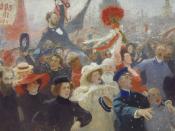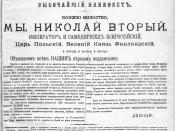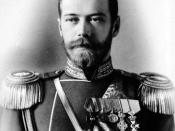The 1905 Russian Revolution was the first of the revolutions that took place in attempt to overthrow Russia's Tsarist (or Imperial Autocracy) regime. The revolution broke out in 1905 because of the public unrest and economic depression caused by the Russo-Japanese war in 1904-5; and because of the "Bloody Sunday" of January 9th, 1905. The significance of the 1905 Revolution was determined by the October Manifesto, which was the Tsar's response to the revolution, and by the Tsarist-opposing parties realisation after the Tsar's issuing of the Fundamental Laws.
In 1904 the Tsar Nicholas II's Minister of the Interior, Plehve, recommended to him that Russia expanded its Empire in the Far East and in doing so create "a small victorious war to stop the revolutionary tide". The resulting Russo-Japanese war was a failure for the Russians, as the Japanese seized Port Arthur and destroyed most of the Russian fleet. The war ended in 1905 with Russia defeated by Japan.
Although the resulting peace treaty (the Treaty of Portsmouth) was relatively easy on the Russians, the defeat was humiliating as Japan was only a second-rate power and should have been easily defeated by Russia, one of the five great powers of the time. The war itself caused significant economic strife in Russia, creating food shortages and mass unemployment. This, added to the public opinion that the war with Japan had been completely unnecessary, created unrest among the Russian population, and many of those who were upset blamed the Tsar.
On January 9th 1905 the Leader of the Assembly of Russian Factory Workers, Father Gapon, led 150,000 workers to the Winter Palace in St. Petersburg to hand the Tsar (also known to the people as the "Little Father" of Russia) a petition asking for the release of political prisoners; freedom of...


